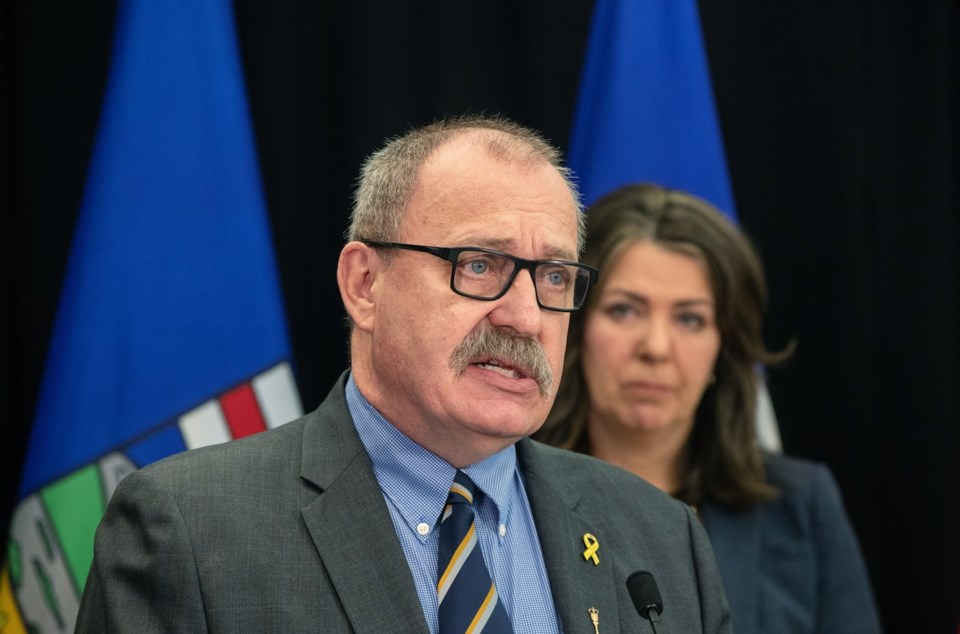EDMONTON — Alberta has announced new regulations that will once again allow corporate and union donations in local elections.
The move by the United Conservative Party government reverses a ban brought in under the NDP.
Municipal Affairs Minister Ric McIver said Friday the changes will boost transparency, accountability and trust in local elections.
"(They) are good for municipalities, good for voters, good for Albertans," he said.
McIver has long contended that corporate and union donations are already influencing municipal elections and the new rules enforce needed boundaries.
They come under a bill that makes sweeping changes, including allowing Premier Danielle Smith's cabinet to initiate ousting locally elected officials by ordering a recall vote and to overturn bylaws that go against provincial policy.
The bill passed debate in the legislature earlier this year and largely comes into effect at the end of this month, just over a year before the next municipal elections.
Alberta Municipalities, which represents municipalities in which more than 85 per cent of Albertans live, has criticized the changes. President Tyler Gandam has said opening the door to big donors puts local governments "up for sale to the highest bidder."
The legislation allows local political parties and slates on the ballot beginning in 2025, but only in the province’s two largest cities, Edmonton and Calgary.
Calgary Mayor Jyoti Gondek called the new rules "the kiss of death to local representation and local democracy.”
“Getting a candidate who's doing this for the right reasons is no longer the priority," she said. "Running candidates who have more money — that seems to be the priority of this province."
Edmonton Mayor Amarjeet Sohi also raised concerns.
"We know that political parties in local elections are deeply unpopular, but the province is tilting the playing field against anyone who doesn’t want to participate in their system."
Local parties would be limited to spending $1 per person in a municipality's population, based on the number of wards in which they have endorsed candidates, during an election year. Third-party advertisers would be able to spend at half that rate.
Likewise, candidates would be limited to spending $100,000 on a municipal campaign where the population is 100,000 people.
"Because you're able to fundraise for the party as well as the candidate, I think it just gives it an unfair advantage for those who align or have joined a political party versus an independent," said Gandam.
McIver said the aim is to mirror existing provincial election laws.
"There's a certain element of what's good for the goose is good for the gander," he said.
Individuals, corporations and unions are capped at contributing $5,000 to all local parties per jurisdiction per year.
Kyle Kasawski, NDP municipal affairs critic, said in a statement Friday the bill is another attempt by the United Conservatives to keep their thumb on the scale of municipal matters.
"With Bill 20, the UCP are trying to bully local elected officials and ensure that they install people friendlier to their agenda,” said Kasawski.
Another contentious change is a provincial ban on electronic tabulators.
On Friday, McIver dismissed concerns municipalities have aired about having to shoulder the added costs.
He said it's worth it to increase confidence in election results, pointing to a survey that suggests 36 per cent of Albertans support banning tabulators.
"Municipalities are responsible to pay for the cost of municipal elections. That's always been the case, and that has not changed," he said.
Sohi reiterated in a statement that tabulators are safer, more secure and more reliable, and switching to hand-counted ballots would cost Edmonton taxpayers over $2.5 million in 2025.
Calgary has estimated it would cost $1.3 million to implement the new rules in the next election, including hand counting ballots.
"It's probably our job to dispel the myths around tabulators, more so than try to appease people who have a conspiracy theory," said Gondek.
Paul McLauchlin, Rural Municipalities of Alberta president and Ponoka County Reeve, said the UCP isn't listening to the concerns of rural leaders either, and it's letting a small number of party members drive policy.
He said that includes a tabulator ban that will push election results by three to five days in some areas.
"We didn't ask for this," he said.
This report by The Canadian Press was first published Oct. 18, 2024.
Lisa Johnson, The Canadian Press



